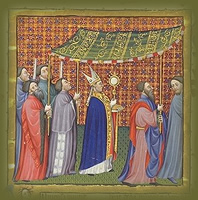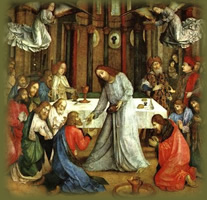 |
 |
Corpus
Christi procession Breviary of Martin of Aragon Spain, Catalonia 15th Century |
The Institution of the Eucharist Joos van Wassenhove, c.1474 |
And he took bread, gave thanks and broke it, and gave it to them, saying, “This is my body given for you; do this in remembrance of me.” Luke 22:19
On the night before his crucifixion, Jesus met with his disciples to observe the Jewish feast of Passover (Pesach). From the passage quoted above, it seems clear that when it came time for the ritual blessing of the bread and the wine, he felt an intimation of what was to come. This ‘last supper’ that he shared with his disciples is remembered on Maundy Thursday, and the Christian belief that Jesus gave his life for the salvation of humankind is remembered by Christians in the mystery of the Holy Eucharist*.
The idea for a specific feast day in honour of this mystery—now celebrated in the Western Church as Corpus Christi (‘body of Christ’)—came from Juliana of Liège, a thirteenth century nun who had a lifelong devotion to the Eucharist. Her pleas eventually reached the local bishop who in 1247 established the first festival of that name. Eventually Pope Urban IV published a decree extending the observance to the whole of the church.
By the fourteenth century it became customary on Corpus Christi Day to follow the Mass with a procession of the Eucharist. This was encouraged by the popes, some of whom granted special indulgences to participants; in the 16th century the Council of Trent recommended these processions on the grounds that they were a public profession of the belief in the presence of Christ in the sacrament.
Corpus Christi processions are held to this day, particularly in countries with a large Catholic population. The consecrated host is held aloft and In many places sovereigns, presidents and ministers of the state, magistrates, members of trade and craft guilds, and honour guards will accompany the procession to the accompaniment of bands and pealing bells. In France and central Europe Corpus Christi Day is the “Day of Wreaths” (Kranzeltag) when wreaths and bouquets of flowers are attached to flags, banners and houses; in many places, especially in Latin American countries, the streets are covered with carpets of grass and flowers. The Anglican Church celebrates a Thanksgiving for Holy Communion on the Thursday preceding the observance of Corpus Christi.